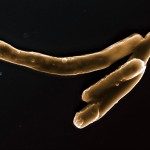Lien vers Pubmed [PMID] – 18771745
Microbes Infect. 2008 Oct;10(12-13):1379-86
We recently showed that treatment of macrophages prior to Mycobacterium tuberculosis infection with the pro-inflammatory omega-6 lipid, arachidonic acid (AA) enhanced bacterial killing whereas the anti-inflammatory, omega-3 lipid eicosapentaenoic acid (EPA) stimulated bacterial growth. Here we tested if these effects were depending on when lipids were added to macrophages: before or during Mycobacterium smegmatis or M. tuberculosis infection. Collectively, our data suggested that a high omega-6 diet might be beneficial against mycobacteriosis, while a high omega-3 diet might be detrimental. AA also stimulated TNF-alpha secretion in M. tuberculosis-infected macrophages whereas EPA inhibited this process. AA strongly activated the MAP kinase p38 in uninfected cells but M. tuberculosis infected cells blocked the ability of AA to activate p38; AA-dependent killing is therefore independent of p38. We therefore tested diets enriched in omega-3 and omega-6 lipids on a mouse model of tuberculosis. In contrast to the in vitro results, the omega-6 tended to increase survival of M. tuberculosis in mice, while omega-3- tended to increase pathogen killing. Overall our results together with those previously reported in the literature suggest that it is almost impossible to predict, at the whole organism level, if a diet enriched in omega-3 or -6 will be beneficial or detrimental to intracellular pathogens.

